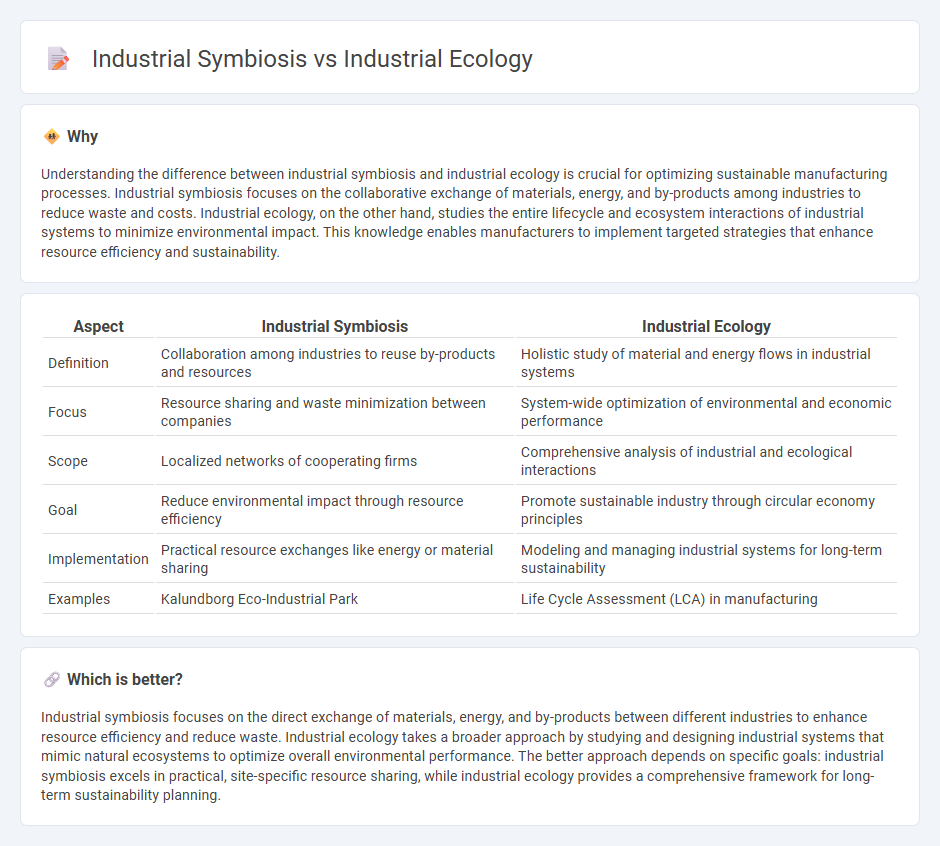
Industrial symbiosis focuses on the collaborative exchange of materials, energy, and by-products between different manufacturing enterprises to enhance resource efficiency and reduce waste. Industrial ecology studies the broader systemic integration of industrial processes with natural ecosystems to promote sustainable development and minimize environmental impact. Explore more to understand how these approaches transform modern manufacturing sustainability.
Why it is important
Understanding the difference between industrial symbiosis and industrial ecology is crucial for optimizing sustainable manufacturing processes. Industrial symbiosis focuses on the collaborative exchange of materials, energy, and by-products among industries to reduce waste and costs. Industrial ecology, on the other hand, studies the entire lifecycle and ecosystem interactions of industrial systems to minimize environmental impact. This knowledge enables manufacturers to implement targeted strategies that enhance resource efficiency and sustainability.
Comparison Table
| Aspect | Industrial Symbiosis | Industrial Ecology |
|---|---|---|
| Definition | Collaboration among industries to reuse by-products and resources | Holistic study of material and energy flows in industrial systems |
| Focus | Resource sharing and waste minimization between companies | System-wide optimization of environmental and economic performance |
| Scope | Localized networks of cooperating firms | Comprehensive analysis of industrial and ecological interactions |
| Goal | Reduce environmental impact through resource efficiency | Promote sustainable industry through circular economy principles |
| Implementation | Practical resource exchanges like energy or material sharing | Modeling and managing industrial systems for long-term sustainability |
| Examples | Kalundborg Eco-Industrial Park | Life Cycle Assessment (LCA) in manufacturing |
Which is better?
Industrial symbiosis focuses on the direct exchange of materials, energy, and by-products between different industries to enhance resource efficiency and reduce waste. Industrial ecology takes a broader approach by studying and designing industrial systems that mimic natural ecosystems to optimize overall environmental performance. The better approach depends on specific goals: industrial symbiosis excels in practical, site-specific resource sharing, while industrial ecology provides a comprehensive framework for long-term sustainability planning.
Connection
Industrial symbiosis and industrial ecology are interconnected concepts that optimize resource efficiency in manufacturing by promoting the exchange of materials, energy, and by-products among industries. This collaboration reduces waste and environmental impact while enhancing economic benefits through circular processes. Implementing these strategies supports sustainable manufacturing by integrating ecological principles into industrial systems.
Key Terms
**Industrial Ecology:**
Industrial Ecology explores the sustainable integration of industrial systems with natural ecosystems, emphasizing resource efficiency, waste minimization, and life cycle thinking to reduce environmental impacts. It involves analyzing material and energy flows in production processes to create closed-loop systems that mimic natural ecological cycles. Discover how Industrial Ecology transforms industries towards sustainability by optimizing resource use and reducing waste.
Material Flow Analysis
Industrial ecology centers on optimizing resource cycles and minimizing waste through system-wide approaches, while industrial symbiosis emphasizes collaborative exchanges of materials between industries to enhance sustainability. Material Flow Analysis (MFA) is pivotal in both, providing quantitative data to track resource inputs, outputs, and losses within industrial systems for improved decision-making. Explore detailed methodologies and case studies to deepen your understanding of how MFA drives circular economy practices in these fields.
Life Cycle Assessment
Industrial ecology integrates Life Cycle Assessment (LCA) to evaluate environmental impacts across production systems, emphasizing resource efficiency and waste reduction throughout the entire product lifecycle. Industrial symbiosis applies LCA to quantify the benefits of material and energy exchanges between industries, optimizing resource utilization and minimizing collective environmental footprints. Explore further to understand how combining these approaches enhances sustainable industrial development.
Source and External Links
Industrial ecology - Wikipedia - Industrial ecology studies material and energy flows through industrial systems to shift from linear wasteful processes to closed loops where waste becomes input, inspired by natural ecosystems to promote sustainability and eco-efficiency.
What is industrial ecology? - ISIE - Industrial ecology examines the systemic relationships between society, economy, and environment, applying ecological concepts to industrial systems to reduce environmental impact and promote sustainable development through quantitative methods.
MSc Industrial Ecology - TU Delft - Industrial ecology is a scientific discipline focusing on sustainable coexistence between technological systems and the environment by modeling industry on natural ecosystems where waste is reused as input, encouraging efficient resource use and less pollution.
 dowidth.com
dowidth.com